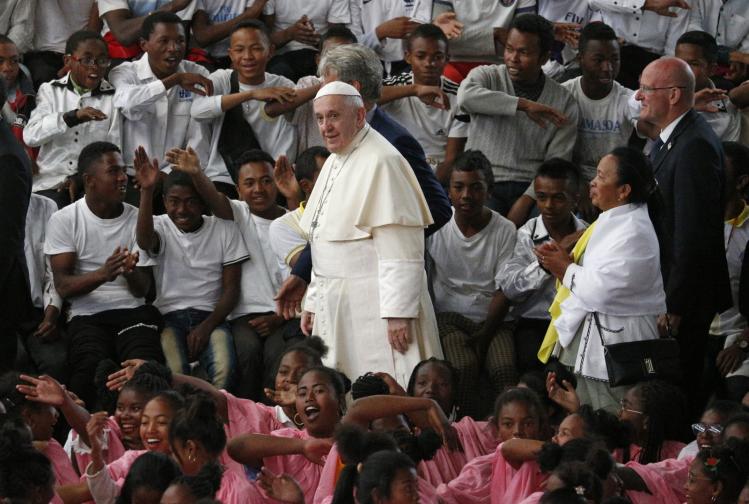
The extraordinary images of Francis’s trip to the African nations of Mozambique, Mauritius, and Madagascar last month illustrate the popularity of this pope in a part of the world that will be vital to the future of the Catholic Church. Throngs of people pressed around him, hoping to receive a blessing or catch a glimpse of him up close, as children sang to welcome his arrival. The scene in Madagascar was especially striking: the Vatican estimates that a million people gathered for Mass outside the capital city, Antananarivo, many of them having camped overnight in a field to secure their place.
“It is a visit that touches many themes close to his heart,” Francis’s adviser Antonio Spadaro, SJ, said as the trip began. The pope’s choice of these three nations itself underscored his special concern for poverty, climate change, and migration, and what he did while visiting them exemplified his persistent calls to go to “the peripheries.” In Mozambique, he visited with HIV/AIDS patients and praised the country’s recent ceasefire agreement that put a stop to its civil war. In Mauritius, he lauded the way the country sustains its rich religious diversity. And in Madagascar, he visited the Akamasoa development project, built near the site of a former garbage dump, to pray for the many people who live there and labor at a nearby quarry.
But the words of Francis’s homily at the Mass in Antananarivo, about the struggle to follow Jesus, were no less striking than these images. They had an unmistakable edge. “The new life the Lord holds out to us seems troubling and scandalously unjust to those who think that entry into the kingdom of heaven can be limited or reduced only to bonds of blood or membership in a particular group, clan or particular culture,” he said. Francis urged those gathered to take on the work of solidarity, to fight exploitation, never to be indifferent to the suffering of others. That so many are so poor is not a part of God’s plan, he said, railing against the idolatry of “power, career, money and of the search for human glory.” He reminded listeners that “Jesus calls us to die to our self-centeredness, our individualism and our pride,” which allows “the spirit of fraternity to triumph, a spirit in which everyone can feel loved because they are understood, accepted and appreciated in his or her dignity.”
These words were overshadowed, however, by remarks Francis made on the papal plane at the beginning and end of his journey. As he left Rome, he quipped that it was “an honor that the Americans attacked me,” a seeming reference to the well-funded conservative Catholics in the United States who have opposed much of his papacy. (An aide quickly walked back the comments.) And on his return flight to the Vatican, he speculated about the role that such an ideological approach to the faith might have in fomenting schism—which he prays doesn’t happen, but also doesn’t fear.
It was appropriate for Francis to address this situation forthrightly. For years, conservative Catholics in the United States have attacked and belittled the pope, comparing him to Donald Trump, calling Francis the “chief plotter” in an effort to undermine church teaching, and resisting nearly every priority he’s set for his papacy, from fighting the climate crisis to caring for migrants and refugees to at least exploring how best to minister to divorced and remarried Catholics. More recently, Cardinal Raymond Burke indulged speculation that the conclave that elected Francis might not have been valid, suggesting that there “certainly are the indications” this was possible, even if he wasn’t sure “concrete proofs” existed. And Archbishop Carlo Maria Viganò, a hero to the American anti-Francis faction, recommended a delirious book about the Masonic infiltration of the church—seeming to link this supposed subversion to both Vatican II and the current pope. There are, of course, legitimate criticisms to be made of Francis, and loyal dissent should not be dismissed out of hand. But the conspiracy-mongering in which many of the pope’s most outspoken opponents indulge seems increasingly delusional and dangerous. It serves only to foment even greater division in the church.
In any case, the pope’s remarks about schism should not be allowed to obscure the far more important message that emerged from his trip to Africa. That message was: Humble yourself. Seek the face of Jesus in the poor and the suffering. Give up your quest for power and wealth. Turn from your sin while there is still time and let God’s grace create in you a spirit of meekness, generosity, and love. Only a church that lives out these virtues, looking always to the risen Lord, will experience genuine unity.